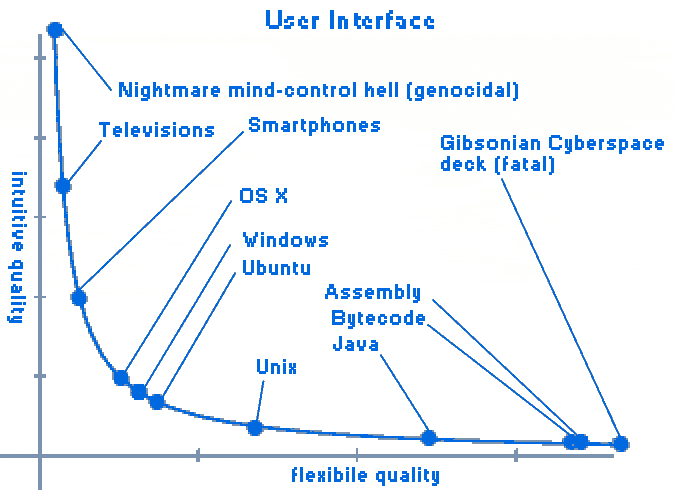
User Interface, or any mediation between a human and a computer, may show an inverse relation between intuitive and flexible qualities. In computer jargon, ‘intuitive’ describes the quality of common accessibility. The ‘flexible’ quality here represents explicitness. The most explicit computer language provides the human with fundamental access to the workings of the machine. In the realm of mechanical logic gates, precise statements translate into coercive power over the machine and by extension power over the Machine. The great collective of interconnected small ‘m’ machines form the meta-machine, the big ‘M’ Machine. The Machine is the mechanized aspect of Inglip.
Cory Doctorow has spoken of the “Death of Generalized Computing,” correctly predicting the hegemony’s strong preference for intuitive interface. For those who don’t know, ‘hegemony’ is just a word that means “almost everyone, but more specifically the people who know how to give almost everyone exactly what they want.” Maximally intuitive interface is just good business practice, and I can’t think of a much more banal observation.
Assembly language is a poor mediator because it is the machine’s operant language. Vast but microscopic arrays of logic gates operate on superficially incomprehensible ones and zeros signifying electrical pulses. Higher languages, like C++, mediate this mess with recognizable signifiers which may represent many hundreds or thousands of Assembly commands. These languages are often a bizarro over-punctuated combination of math and English, where the English expressions are more precise than the math.
William Gibson envisioned a level of flexibility beyond Assembly wherein crackers broke into computers “directly” with their brain, visualizing the interaction with amorphous three dimensional geometric objects–‘ICE’. The fictional brain-to-computer interface, the cyberspace ‘deck’, operated on a level so fundamental that encounters with ICE were potentially fatal. Such spatial representations are, paradoxically, a kind of superlative intuitive interface.
Exploits, or cracks, take advantage of weaknesses inherent in these more intuitive but less specific languages. The flexibility of the more fundamental language can subvert, corrupt, and reroute less explicit language.
An advanced intuitive interface may very well be represented with some geometric Minecraft-like ICE, but that must be built on top of fundamental Assembly language. This is the true crux of the TransHumanist’s interface dilemma. With more impressive and intuitive interface comes less flexibility for the user. The users become more alienated from the very specific underlying language making up cyberspace in this TransHuman imagining. Those fluent in machine language are the true Hegemonic TransHumans, bonded to the computers as intimately as if the computers were external organs. For them, the computer acts as an extension of pure will. The smartphone addict appears to share this same kind of organic bond with technology, and it is not completely superficial. In the smartphone, though, the artificial organ is completely trapped by hegemony and more of the Machine than of the subject.
*Exploits may be arrived at and implemented algorithmically, so it is wrong to say that more intuitive computer interfaces are not used to detect and exploit security holes. However, this kind of alogirthm is written only with a complete working knowledge of explicit machine code and cannot exist solely within the confines of the intuitive language it must short-circuit.

5 replies on “User Interface”
Not in contradistinction, but in a simpler sense; Gibson states that ICE is an acronym for Intrusion Countermeasures Electronic. It is in this simpler sense that ICE has entered the software vernacular for many types of cyber-security. A firewall is a nascent form of ICE. trying not to be a dick, just thought I add the info.
Thanks, fixed that spelling and tricky wording there.
should I update the flyer?
BRB after I get my PhD in mathematics and computer science! Shit do you even know what you’re talking about fishfag!?
Very interesting points you have observed , regards for posting . “Strength does not come from physical capacity. It comes from an indomitable will.” by Mohandas Karamchand Gandhi.